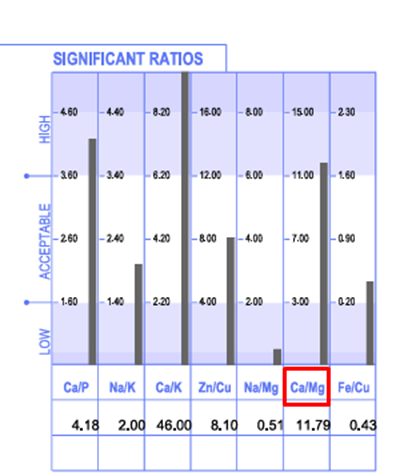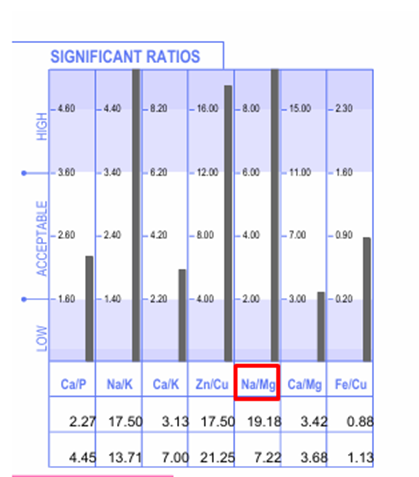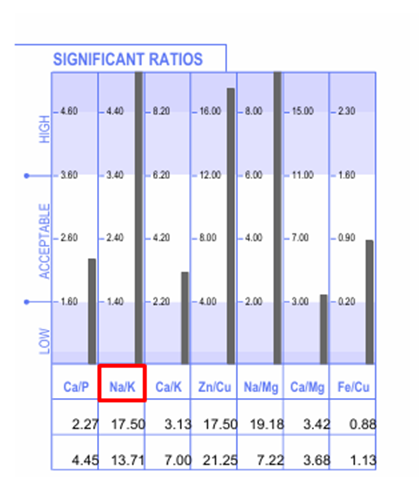Introduction to Diabetes and the Role of Mineral Balance
Blood sugar dysregulation is a common issue that can develop quietly over years, often going undiagnosed until symptoms become severe enough for a diabetes diagnosis.
Many people may experience blood sugar imbalances for over a decade before they become formally recognized, making early detection and intervention essential. Identifying imbalances early provides an opportunity to prevent or manage chronic health conditions more effectively.
Common symptoms of blood sugar dysregulation include:
- Fatigue or low energy
- Difficulty focusing or “brain fog”
- Frequent thirst or dry mouth
- Frequent urination
- Intense cravings for sweets or carbohydrates
- Irritability or mood swings
- Anxiety, especially before meals
- Poor stress tolerance
- Difficulty losing weight or unexplained weight gain
- Dizziness or shakiness between meals
- Headaches, especially if meals are delayed
- Poor wound healing
- Tingling in hands or feet
- Blurred vision
One approach to get ahead of and address potential blood sugar imbalances is through Hair Tissue Mineral Analysis (HTMA). HTMA tests measure mineral ratios, which reflect metabolic processes and how efficiently the body manages blood sugar and insulin sensitivity.
By uncovering these ratios, HTMA provides valuable insights into underlying factors influencing blood sugar control and diabetes risk.
How HTMA Reveals Key Mineral Ratios for Blood Sugar Regulation
HTMA provides a non-invasive method of analyzing mineral levels in hair samples. Not only are the individual markers important but also the ratio between key markers offers clues about metabolic health, including thyroid and adrenal function, insulin activity, and stress response—all of which are critical for maintaining stable blood sugar.
Below, we’ll explore five key mineral ratios measured by HTMA and explain how they can impact blood sugar management and diabetes risk.
Key Mineral Ratios and Their Impact on Blood Sugar Regulation
1. Calcium/Magnesium Ratio (“Blood Sugar Ratio”)
- Overview: Calcium and magnesium are essential minerals involved in cellular energy production and insulin sensitivity. Magnesium is critical for insulin receptor function, which allows glucose to enter cells. While calcium is necessary, too much relative to magnesium can impair magnesium’s role.
- Relation to Blood Sugar: An imbalanced calcium/magnesium ratio can disrupt insulin function, with high calcium relative to magnesium often leading to insulin resistance, which makes it difficult to control blood sugar. Low calcium relative to magnesium, on the other hand, may suggest a tendency toward elevated blood sugar.

2. Sodium/Magnesium Ratio (“Adrenal Ratio”)
- Overview: The sodium/magnesium ratio reflects adrenal health, which is crucial for blood sugar regulation. The adrenal glands release cortisol, a hormone that raises blood sugar levels in response to stress.
- Relation to Blood Sugar: High sodium relative to magnesium can signal increased adrenal activity, resulting in higher cortisol levels, which may cause frequent blood sugar spikes. Over time, this leads to insulin resistance as the body becomes less sensitive to glucose. Conversely, a low sodium-to-magnesium ratio may indicate adrenal fatigue, making it challenging for the body to produce adequate cortisol to maintain stable blood sugar.

3. Sodium/Potassium Ratio (“Stress Ratio”)
- Overview: Sodium and potassium work together to maintain cellular fluid balance and adrenal health, both of which play essential roles in the body’s response to stress. This ratio gives a clear view of stress levels, as sodium is vital for cortisol production.
Relation to Blood Sugar: Elevated sodium relative to potassium indicates high cortisol production due to stress, which can disrupt blood sugar regulation. Chronic high cortisol is known to promote insulin resistance, making stable blood sugar levels challenging to achieve. Conversely, a low sodium/potassium ratio may signal adrenal fatigue, reducing cortisol output and impairing blood sugar control.

4. Calcium/Potassium Ratio (“Thyroid Ratio”)
- Overview: The calcium/potassium ratio provides insights into thyroid function, a regulator of metabolism. The thyroid gland influences glucose metabolism and helps regulate how the body uses sugar for energy.
Relation to Blood Sugar: A high calcium/potassium ratio often correlates with a sluggish thyroid, slowing down metabolic processes and making insulin resistance more likely, thus complicating blood sugar control. Conversely, a low calcium-to-potassium ratio may indicate an overactive thyroid, leading to faster glucose metabolism and fluctuating blood sugar levels.

5. Zinc/Copper Ratio (“Blood Sugar & Immune Ratio”)
- Overview: Zinc and copper are essential for immune function, enzyme activity, and inflammation regulation. Zinc supports insulin production, while copper plays a role in immune and inflammatory responses.
- Relation to Blood Sugar: A high zinc/copper ratio may indicate a copper deficiency, potentially impairing glucose metabolism. Low zinc relative to copper may point to chronic inflammation, which contributes to insulin resistance and blood sugar dysregulation.

Practical Application: Using HTMA Results to Support Blood Sugar Health
HTMA results give a clear picture of specific mineral imbalances that may impact blood sugar regulation. By using these insights to tailor nutrient intake, we can improve blood sugar control.
When we craft custom multivitamin blends like Vykon, our goal is to restore balance back to the body and improve these mineral rations. Addressing these specific mineral needs, improving insulin sensitivity and supporting more balanced blood sugar levels.
Beyond Minerals: Additional Nutrients to Support Blood Sugar and Insulin Sensitivity
When we craft custom Vykons, we also include other supportive nutrients to help in cases of blood sugar management. These can play crucial roles in supporting insulin sensitivity, reducing inflammation, and improving metabolic function.
Some of these might include:
- Alpha-Lipoic Acid (ALA): ALA is a potent antioxidant that has been shown to improve insulin sensitivity by enhancing glucose uptake in cells. It also helps combat oxidative stress, a common issue in diabetes that contributes to cellular damage and inflammation.
- Coenzyme Q10 (CoQ10): CoQ10 supports mitochondrial function and energy production at the cellular level, which is essential for insulin sensitivity. It also acts as an antioxidant, helping to reduce oxidative damage and improve overall metabolic health.
- Chromium: Chromium plays a role in insulin signaling and glucose metabolism, helping the body efficiently process and store blood sugar. Research suggests that chromium supplementation may improve insulin sensitivity and help lower blood glucose levels in individuals with diabetes.
- Vitamin C: High blood sugar levels can reduce vitamin C levels in the body, impacting immune function and antioxidant defense. Vitamin C helps counter oxidative stress and inflammation, promoting better blood vessel health and reducing risks of complications associated with diabetes.
- Vitamin E: As a potent antioxidant, vitamin E protects cells from oxidative damage, which is heightened in people with blood sugar issues. It can also improve blood vessel health, reduce inflammation, and support insulin function.
- N-Acetyl Cysteine (NAC): NAC boosts glutathione, a powerful antioxidant that defends against cellular stress and inflammation. It also supports liver function and blood sugar stability by helping the body detoxify, which can improve insulin sensitivity.
- Vitamin B Complex (especially B1, B6, and B12): B vitamins are crucial for energy production and glucose metabolism. For example, vitamin B1 (thiamine) helps prevent diabetic complications related to nerve and blood vessel damage, while B6 and B12 are essential for supporting nerve health and reducing homocysteine levels, which can impact cardiovascular health.
By incorporating these nutrients, a Vykon custom blend provides a well-rounded approach to improving blood sugar regulation, reducing inflammation, and supporting insulin sensitivity. Each blend is tailored to your unique needs based on HTMA results, ensuring the right nutrients are combined with minerals for maximum impact on blood sugar and metabolic health.
Success Stories: Real Results with HTMA and Customized Nutrient Support
Clients who have incorporated HTMA insights into their nutritional strategies often experience life-changing improvements in blood sugar regulation, energy levels, and overall well-being.
By addressing specific mineral imbalances, they are better able to manage blood sugar and prevent the rollercoaster effects of dysregulation.
Diabetic Clients:
For clients with diabetes, using HTMA to identify and correct key mineral imbalances has led to measurable improvements in insulin sensitivity and better blood sugar stability.
For example, many report fOne of our type 1 diabetes clients noticed a huge improvement in blood sugar as she titrated on her custom Vykon blend. As you can see in the image, the 2 weeks prior to adding in her Vykon, she had 42% above range and the two weeks she started titrating (of a four-week titration), she was out of range for only 35% of the time.
Things continued to improve from there as well. As time went on, she experienced fewer blood sugar spikes and crashes and a more predictable energy flow throughout the day.

Non-Diabetics with Blood Sugar Dysregulation:
For clients who may not have diabetes but struggle with symptoms of blood sugar dysregulation, such as cravings, energy crashes, and irritability, HTMA testing has provided a pathway to stabilization.
By balancing minerals like sodium and potassium, these clients have seen significant improvements in day-to-day energy levels, fewer cravings for sweets, and a noticeable boost in mood and focus.
Clients often share that they feel more in control of their appetite, experience less irritability, and can handle daily stressors without the usual energy dips—a sign that their blood sugar is more balanced.
Preventative Health and Improved Metabolic Resilience:
Beyond symptom relief, HTMA has also helped clients proactively address imbalances to prevent the progression toward insulin resistance and diabetes.
Clients who were previously unaware of hidden imbalances—such as high calcium/magnesium ratios or low sodium/potassium levels—have found that rebalancing these minerals improves their resilience to stress and supports sustained blood sugar control.
Many report feeling empowered by having a clear understanding of their body’s unique needs and can actively prevent blood sugar issues from advancing.
By using HTMA as a guide, clients experience the benefits of a more targeted approach to nutrient intake, tailored specifically to their bodies. With customized support, they can confidently manage their blood sugar and feel more energized, balanced, and in control of their health journey.
Conclusion & Call to Action
Taking control of blood sugar health early is key to preventing chronic issues. If you’re ready to gain a deeper understanding of how mineral balance impacts your blood sugar, consider getting an HTMA test. HTMA results provide personalized insights, helping you take actionable steps before issues become long-term conditions.
By supporting your mineral balance with a custom Vykon blend, you can optimize blood sugar control and support metabolic health.
Click here to learn more about HTMA testing and take your next step toward better health!

